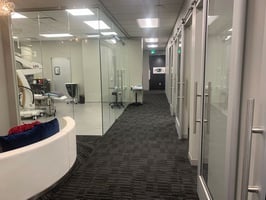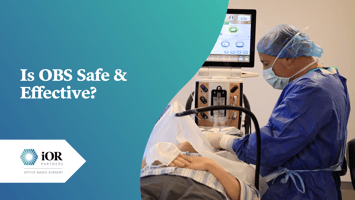Covid Affecting Office-Based Surgery Pre COVID-19, most patients undergoing surgery experienced...
Top 5 Questions About the Safety of Office-Based Cataract Surgery Answered
When it comes to office-based surgery (OBS), the first question on every ophthalmologist’s mind is, "Is OBS safe?" This is an understandable concern as surgeons shift to this emerging model of care. However, just as cataract surgery safely transitioned from hospitals to ambulatory surgery centers (ASCs) in the 1980s, OBS is poised to become the trusted norm for cataract procedures in the near future. Here, we address the top questions about the safety of office-based cataract surgery, dispelling myths and demonstrating the remarkable results this setting can achieve.
What Sets Office-Based Cataract Surgery Apart?
A common misconception is that office-based surgeries are conducted in simple clean rooms or standard procedure rooms. This is not the case. OBS takes place in a fully accredited operating room located within a physician’s practice. These facilities meet the stringent safety standards required by accrediting organizations like The Joint Commission.
Simply put, OBS offers the same safety assurance as ASCs, but with the added benefits of surgeon-controlled processes and closer patient oversight.
Which Ophthalmic Procedures Are Best Suited for OBS?
OBS settings are ideal for a variety of ophthalmic procedures, making them a versatile solution for modern surgical practices. Common procedures include:
- Basic cataract surgery
- Refractive cataract surgery
- Refractive lens exchange
- Implantable Collamer Lens (ICL) placement
- Oculoplastic procedures
- Minimally invasive glaucoma surgeries (MIGS)
- Other lens-based procedures
The ability to perform such a range of procedures showcases OBS’s adaptability without compromising safety or outcomes.
What Does the Data Say About OBS Outcomes?
Clinical outcomes of OBS cataract surgeries are consistently safe and effective, mirroring the excellence of procedures performed in ASCs. A landmark study by Kaiser Permanente, one of the largest of its kind, examined 21,501 office-based cataract surgeries. The findings are exceptional efficacy and safety outcomes on par with minimally invasive cataract surgeries performed in ASCs and hospital outpatient departments (HOPDs).
More recently, a comprehensive study by Kugler et al. reviewed the case records of 18,005 patients who underwent office-based surgery (OBS) for visually significant cataracts, refractive lens exchange (RLE), or phakic IOL implantation at 36 U.S. sites. According to Dr. Lance J. Kugler, director of Kugler Vision in Omaha, NE, the findings underscore the impressive safety of office-based lens surgery.
At iOR Partners, we've collected data on over 90,000 OBS procedures. Our performance data further confirms a safety profile that matches or surpasses those in the Kaiser study. These results affirm that office-based cataract surgery delivers world-class patient care across the board.
What Type of Anesthesia is Used in OBS?
Anesthesia in office-based surgery is the surgeon’s choice, while maintaining high safety standards. OBS typically utilizes either Class A (oral and topical anesthesia) or Class B (IV sedation). Interestingly, many OBS cases are performed with Class A anesthesia, which requires no additional patient monitoring or specialized staffing. This ensures a seamless and efficient workflow for both patients and surgical teams, further enhancing the appeal of OBS for ophthalmic practices.
Can Patients with Comorbidities Safely Undergo OBS?
The presence of comorbidities is carefully assessed on a case-by-case basis. Surgeons can choose to take patients with significant comorbidities to an ASC, however, many surgeons gain confidence over time in managing these patients within the OBS environment. Outcomes data collected from cases performed in iOR Suites shows that patients 65 and older with comorbidities had occurrence rates similar to the total cohort.

For patients with complex medical needs, ASCs remain a viable backup option, providing a flexible and safe alternative should additional equipment or advanced anesthesia be required.
Why OBS is the Future of Cataract Surgery
Transitions to new surgical settings often raise valid concerns about safety—but history has shown that innovation in care delivery leads to better outcomes and patient experiences. OBS is no exception. By adhering to the highest safety standards and leveraging advanced protocols, office-based surgery is rapidly becoming the gold standard for cataract care.
Additionally, OBS offers distinct advantages beyond safety. Surgeons benefit from greater autonomy, streamlined workflows, and a personalized approach to patient care that traditional hospital settings or ASCs cannot deliver. These benefits align perfectly with the evolving demands of modern ophthalmology and patient-centered care.
Are you ready to explore how OBS can transform your practice? Take our feasibility analysis to discover how iOR Partners supports surgeons with end-to-end solutions. Together, we can shape the future of cataract surgery.


